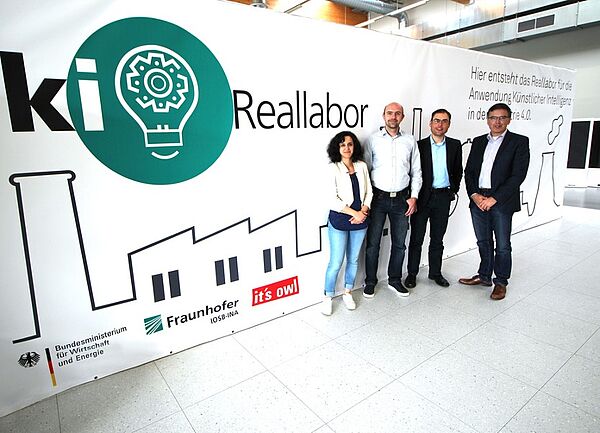Michael is a mechanical engineer. His machines consist of parts from different manufacturers and are used worldwide. He wants to improve efficiency for his customers. To do this, he needs data from the running machines. He wants to evaluate them holistically using artificial intelligence and his operational and design knowledge. However, he has no way to do this in his company.
Limited AI use
That's how it feels for many small and large companies on the road to Industry 4.0 - and likewise for researchers, policymakers and industry associations. "The use of artificial intelligence (AI) is considered a key driver of innovation in the private, public and economic sectors," says Johannes Kalhoff, head of the Platform Industry 4.0's working group on technology and application scenarios. "We need to promote the use of AI methods to shape innovation capabilities." But the use of AI is subject to many limitations. For one thing, current AI technologies have too little direct relevance to practical problems in industry. For another, testing lacks access to usable industrial infrastructure and real-world production facilities. Thus, sensible regulations and legal frameworks are also very difficult at present.
Exploiting potential through cooperation
So how can the gap between research and practice be bridged? The new AI real lab in Lemgo offers one solution. "With the AI Real Lab, we want to create an open and at the same time protected collaboration space for people and technology. With as few regulations as possible, we want to allow innovation processes to explore the potential and impact of AI in close cooperation between science and industry in a real industrial environment," says Prof. Dr.-Ing. Jürgen Jasperneite, Director of Fraunhofer IOSB-INA.
Together with Plattform Industrie 4.0, ZVEI, VDMA, Allianz Industrie 4.0 Baden-Württemberg, SmartFactoryOWL, KI-Marktplatz and Centrum Industrial IT, Fraunhofer has launched the lab. It is funded by the German Federal Ministry for Economic Affairs and Energy (BMWi). Ernst Stöckl-Pukall, Head of Division for Digitization and Industry 4.0 at the BMWi, says: "With the Industrie 4.0 platform, we have established a strong network in Germany that makes projects like the AI real lab possible in the first place. The reallab now offers good opportunities to take innovative, trustworthy and secure data exchange in industry a step forward. It also fits perfectly with the goals we are pursuing with the GAIA-X project, the establishment of a sovereign European data infrastructure."
Interoperability and sovereignty with AI.
In addition to sovereignty, interoperability is also essential in the digital ecosystems of the future. Using AI and standards, data integration of decentralized systems can be significantly simplified. In this way, the AI Real Lab pays tribute to the 2030 mission statement for Industrie 4.0. The lab will develop an Industrie 4.0-compliant data portal. This will bring together data from different sources in a semantically interoperable way. The lab will make the data available for value-added use while maintaining digital sovereignty through data protection and traceability.
The necessary infrastructure
Prof. Dr. Peter Post of Festo SE & Co. KG summarizes: "The AI real lab enables the evaluation and further development of artificial intelligence methods in a realistic industrial environment. The knowledge gathered there is the prerequisite for the reliable application of AI in real production plants with the high demands on reliability and functionality."
So in the AI reallab, machine builder Michael finds the necessary infrastructure. He can access data from his test systems as well as data from selected, interested customers and manufacturers. The machine builder can discuss his ideas with experts and try them out with his customers. Via a hackathon as part of the reallab, he finds a start-up partner who surprisingly expands his idea of an improved service. Michael now offers services in addition to his machine. These increase his competitiveness. With his additional partner, he creates further benefits and also increases his business field as a medium-sized company.
Stay up to date on the AI Reallabor on the website and in the newsletter of Plattform Industrie 4.0.


